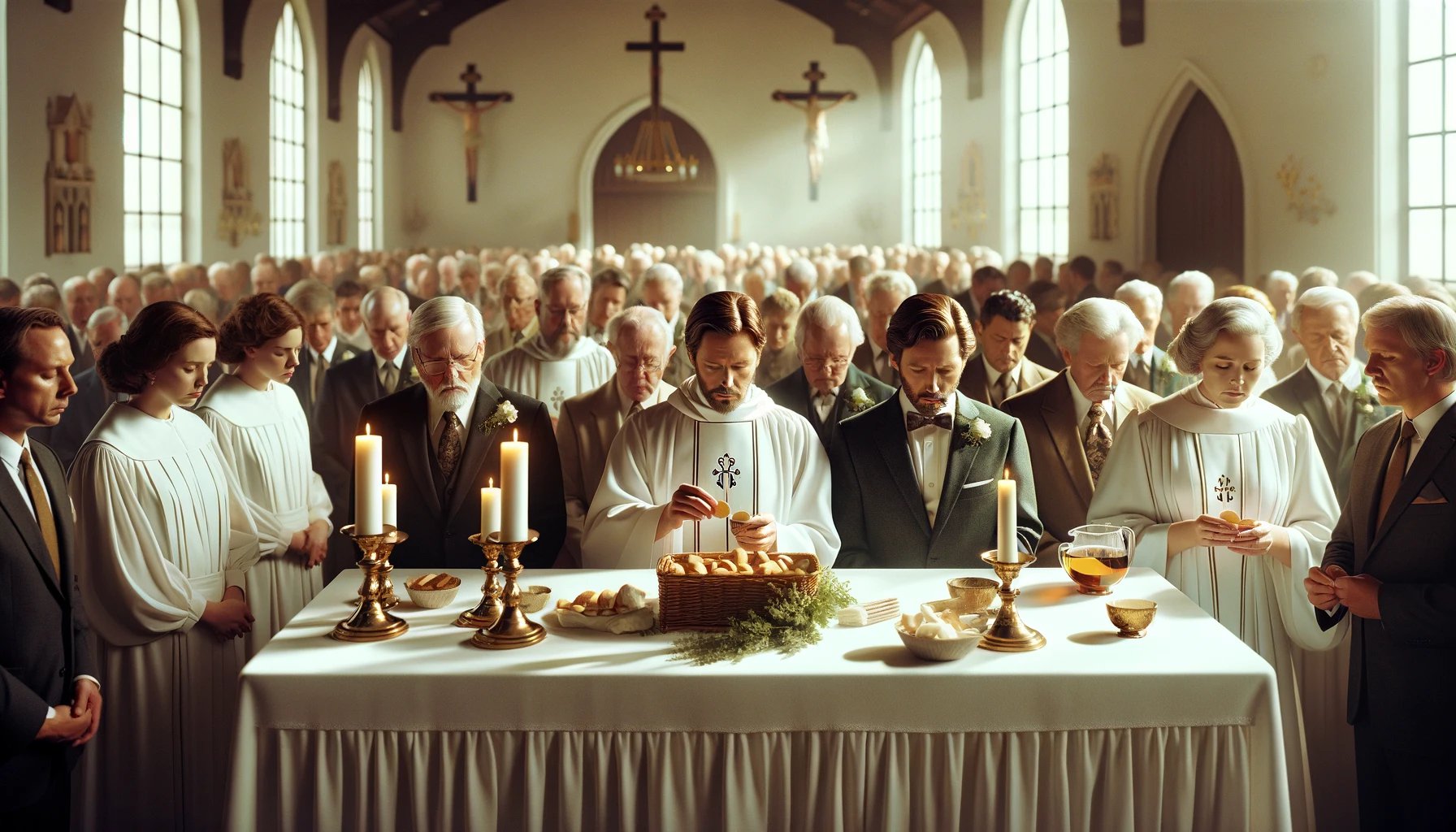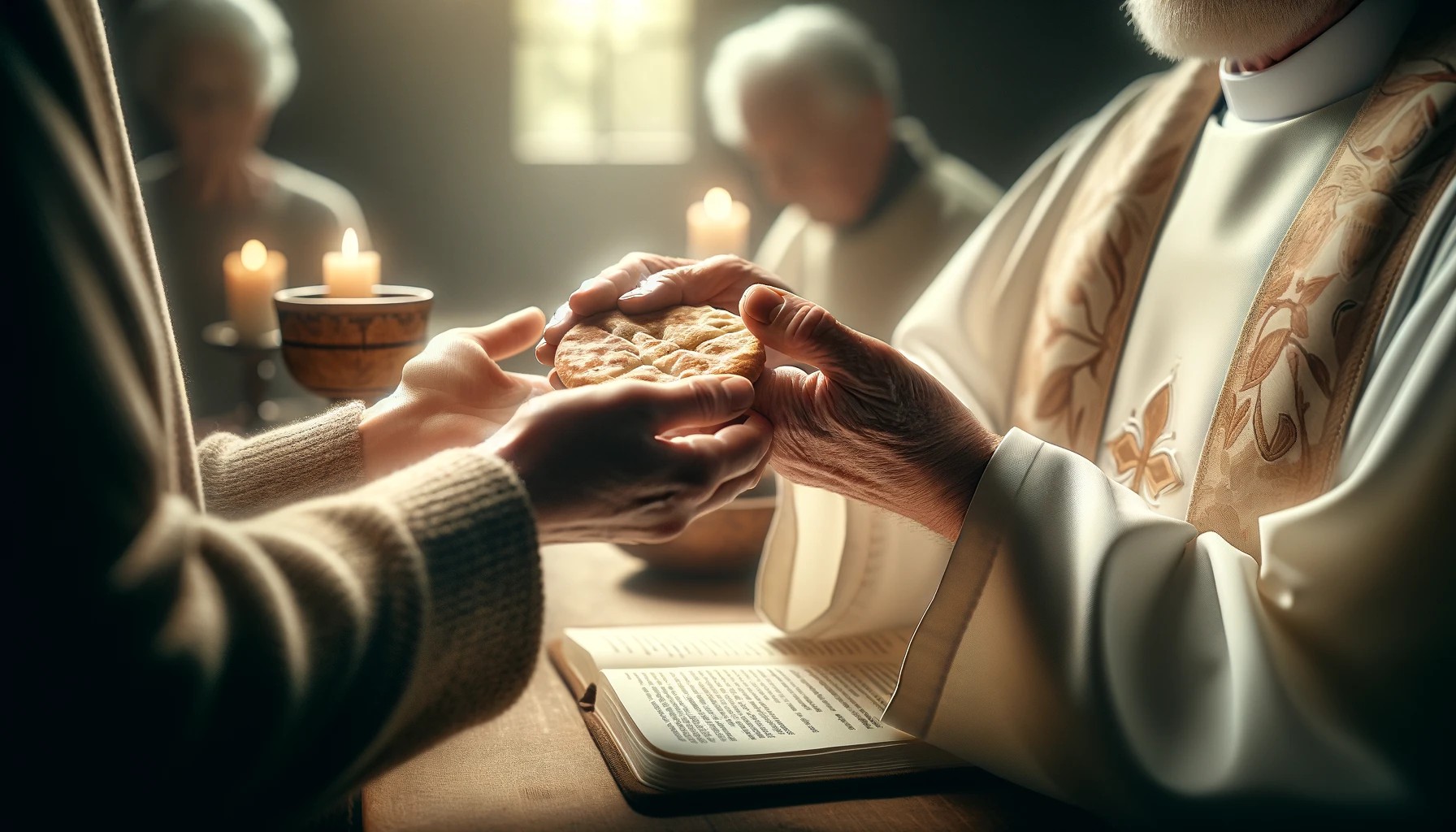Home>Theology and Spirituality>Why Do We Need To Take Communion


Theology and Spirituality
Why Do We Need To Take Communion
Published: February 25, 2024
Peter Smith, Editorial Director at Christian.net, combines deep insights into faith, politics, and culture to lead content creation that resonates widely. Awarded for his contributions to religious discourse, he previously headed a major organization for religious communicators, enhancing dialogue on faith's societal impacts.
Discover the significance of taking communion and its role in theology and spirituality. Explore the reasons behind the practice and its importance in Christian faith.
(Many of the links in this article redirect to a specific reviewed product. Your purchase of these products through affiliate links helps to generate commission for Christian.net, at no extra cost. Learn more)
Table of Contents
Introduction
Communion, also known as the Eucharist or the Lord's Supper, holds a central place in Christian worship and spirituality. It is a sacred ritual that has been practiced for centuries, carrying deep historical and spiritual significance. The act of taking communion involves partaking of bread and wine, symbolizing the body and blood of Jesus Christ, and is a fundamental aspect of Christian faith and tradition.
The practice of communion traces its origins back to the Last Supper, a pivotal event in the life of Jesus Christ. As recounted in the New Testament, during the Passover meal, Jesus shared bread and wine with his disciples, instructing them to partake in remembrance of him. This act of sharing a communal meal with profound spiritual symbolism has been perpetuated through generations, becoming a cornerstone of Christian worship.
Beyond its historical roots, communion holds deep spiritual significance for believers. It serves as a tangible expression of the believer's union with Christ and fellow members of the Christian community. Through the act of partaking in the elements, Christians symbolically reaffirm their faith in the sacrificial death and resurrection of Jesus Christ, acknowledging the spiritual nourishment and sustenance derived from this profound connection.
The symbolism inherent in communion is rich and multifaceted, representing the core tenets of the Christian faith. The bread symbolizes the body of Christ, broken for the redemption of humanity, while the wine represents the blood shed for the forgiveness of sins. This symbolism serves as a poignant reminder of the foundational Christian belief in the atoning sacrifice of Jesus Christ, fostering a deep sense of reverence and gratitude among participants.
Moreover, communion holds immense importance within the Christian community, serving as a unifying and transformative practice. It fosters a sense of shared identity and purpose among believers, transcending individual differences and uniting them in their common faith. The act of partaking in communion together reinforces the communal bond and mutual commitment to living out the teachings of Christ in love and unity.
In essence, communion offers profound personal benefits to believers, nurturing their spiritual growth and deepening their relationship with God. It serves as a sacred moment of reflection, repentance, and renewal, inviting participants to draw closer to the divine and experience the transformative power of God's grace and love.
As we delve deeper into the historical, spiritual, and communal significance of communion, we gain a deeper understanding of its enduring relevance and the profound impact it continues to have on the lives of believers.
Read more: Why Do Pentecostals Take Communion
The Historical Significance of Communion
The historical significance of communion is deeply rooted in the foundational events of Christianity, particularly the Last Supper, a pivotal moment in the life of Jesus Christ. According to the New Testament accounts, during the Passover meal, Jesus shared bread and wine with his disciples, imparting profound spiritual significance to these elements. He instructed his followers to partake in remembrance of him, thereby establishing a sacred ritual that would endure through the ages.
The Last Supper, which took place on the eve of Jesus' crucifixion, holds immense historical importance as it marked the institution of the Eucharist, or communion, within the Christian tradition. This act of sharing a communal meal imbued with spiritual symbolism became a foundational practice for the early Christian community, shaping their worship and communal identity.
The historical significance of communion is further underscored by its continuity through the centuries. From the early gatherings of believers in the first-century Christian communities to the present-day global church, the observance of communion has remained a central and unifying aspect of Christian worship. The enduring nature of this ritual reflects its profound historical roots and the enduring impact of the Last Supper on the collective memory and practice of the Christian faith.
Moreover, the historical significance of communion is intricately linked to the concept of remembrance and continuity. By partaking in the elements of bread and wine, believers engage in a symbolic act of remembrance, commemorating the sacrificial death and resurrection of Jesus Christ. This act of remembrance serves as a powerful link to the historical events of Jesus' life and ministry, fostering a deep sense of connection to the foundational narrative of Christianity.
In essence, the historical significance of communion lies in its role as a living testament to the foundational events of the Christian faith. It serves as a tangible link to the life and teachings of Jesus Christ, preserving the memory of the Last Supper and the enduring impact of his redemptive mission. Through the observance of communion, believers across generations continue to honor and embody the historical legacy of Christ's sacrificial love, affirming its timeless relevance and significance in the life of the Christian community.
The Spiritual Significance of Communion
The spiritual significance of communion transcends mere symbolism, encompassing profound spiritual truths that resonate deeply with the core tenets of the Christian faith. At its essence, communion serves as a tangible expression of the believer's union with Christ and fellow members of the Christian community. Through the act of partaking in the elements of bread and wine, believers symbolically reaffirm their faith in the sacrificial death and resurrection of Jesus Christ, acknowledging the spiritual nourishment and sustenance derived from this profound connection.
Central to the spiritual significance of communion is the concept of spiritual nourishment and sustenance. The act of partaking in the bread and wine represents a spiritual feast, wherein believers partake of the life-giving sustenance derived from their union with Christ. This spiritual nourishment serves as a source of strength, renewal, and sustenance for the journey of faith, empowering believers to live out their calling as followers of Christ.
Furthermore, communion embodies the profound truth of spiritual unity and fellowship within the body of Christ. As believers partake in the elements together, they bear witness to their shared identity as members of the Christian community, united by their common faith in Christ. This act of communal participation underscores the spiritual bond that transcends individual differences, fostering a deep sense of unity and mutual support among believers.
Moreover, the spiritual significance of communion is intricately tied to the concept of spiritual cleansing and renewal. The act of partaking in the elements serves as a sacred moment of reflection and repentance, inviting believers to examine their hearts and seek spiritual renewal in the presence of God. Through this act of self-examination and confession, believers experience the transformative power of God's grace, finding forgiveness and restoration in the communion with Christ.
In essence, the spiritual significance of communion encompasses the profound realities of spiritual nourishment, unity, and renewal within the Christian faith. It serves as a sacred conduit through which believers experience the transformative power of God's love and grace, finding spiritual sustenance, unity, and renewal in their communion with Christ and fellow believers. As such, communion holds enduring spiritual significance, offering believers a tangible expression of their union with Christ and a source of spiritual nourishment and renewal on their journey of faith.
The Symbolism of Communion
The symbolism of communion is deeply profound, encapsulating the core tenets of the Christian faith and serving as a poignant reminder of the sacrificial love and redemptive mission of Jesus Christ. At its essence, communion embodies rich symbolism, with the elements of bread and wine representing the body and blood of Christ, respectively. This symbolism holds deep spiritual significance, offering believers a tangible and transformative expression of their faith and union with Christ.
The bread, a central element of communion, symbolizes the body of Christ, broken for the redemption of humanity. This profound symbolism harkens back to the sacrificial nature of Jesus' mission, wherein his body was broken on the cross to atone for the sins of humanity. As believers partake of the bread, they are reminded of the selfless and redemptive love embodied in Christ's sacrifice, fostering a deep sense of reverence and gratitude for the profound act of redemption.
Likewise, the wine, representing the blood of Christ shed for the forgiveness of sins, carries profound symbolism within the communion ritual. The act of partaking in the wine serves as a poignant reminder of the atoning sacrifice of Jesus Christ, wherein his blood was shed to bring forgiveness and reconciliation between humanity and God. This symbolism underscores the foundational Christian belief in the transformative power of Christ's blood, offering believers a tangible expression of the forgiveness and redemption made possible through his sacrificial love.
Furthermore, the act of sharing in the elements of bread and wine embodies the symbolism of communal participation and spiritual unity within the body of Christ. As believers partake in communion together, they bear witness to their shared identity as members of the Christian community, united by their common faith in Christ. This act of communal participation underscores the spiritual bond that transcends individual differences, fostering a deep sense of unity and mutual support among believers.
In essence, the symbolism of communion serves as a powerful and multifaceted expression of the foundational truths of the Christian faith. Through the elements of bread and wine, believers are invited to reflect on the sacrificial love and redemptive mission of Jesus Christ, finding spiritual nourishment, unity, and renewal in their communion with Christ and fellow believers. This rich symbolism underscores the enduring significance of communion as a sacred ritual that embodies the transformative power of God's love and grace within the Christian tradition.
The Importance of Communion in Christian Community
The importance of communion in the Christian community cannot be overstated, as it serves as a unifying and transformative practice that fosters a deep sense of shared identity and purpose among believers. At its core, communion embodies the communal nature of the Christian faith, inviting believers to partake in the elements of bread and wine together, thereby reaffirming their shared commitment to living out the teachings of Christ in love and unity.
One of the primary reasons for the importance of communion in the Christian community lies in its role as a unifying ritual that transcends individual differences and fosters a deep sense of communal bond. As believers gather to partake in communion, they bear witness to their shared identity as members of the body of Christ, united by their common faith and devotion to the teachings of Jesus. This act of communal participation underscores the spiritual bond that unites believers, fostering a sense of unity, mutual support, and shared purpose within the Christian community.
Moreover, the importance of communion in the Christian community is underscored by its role in fostering spiritual nourishment and renewal among believers. Through the act of partaking in the elements, believers find spiritual sustenance and renewal in their communion with Christ and fellow members of the Christian community. This sacred ritual serves as a source of strength, encouragement, and spiritual nourishment, empowering believers to continue their journey of faith with renewed vigor and conviction.
Additionally, communion holds immense importance in reinforcing the foundational values of love, forgiveness, and unity within the Christian community. As believers partake in the elements together, they are reminded of the sacrificial love and redemptive mission of Jesus Christ, fostering a deep sense of reverence and gratitude for the transformative power of God's grace. This shared experience of communion serves to deepen the bonds of love and unity among believers, inspiring them to embody the teachings of Christ in their interactions with one another and the world.
In essence, the importance of communion in the Christian community lies in its capacity to foster a deep sense of communal identity, spiritual nourishment, and shared commitment to the foundational values of the Christian faith. Through this sacred ritual, believers find strength, unity, and renewal, reaffirming their shared journey of faith and their collective mission to embody the love and teachings of Jesus Christ in the world.
Read more: Why Do Catholics Take Communion
The Personal Benefits of Taking Communion
Partaking in the act of communion offers profound personal benefits to believers, nurturing their spiritual growth and deepening their relationship with God. The experience of taking communion transcends the physical act of consuming bread and wine; it encompasses a deeply personal and transformative encounter with the divine. As individuals engage in this sacred ritual, they experience a range of personal benefits that enrich their spiritual journey and foster a deeper connection with their faith.
One of the primary personal benefits of taking communion is the experience of spiritual nourishment and sustenance. As believers partake in the elements of bread and wine, they symbolically receive the spiritual nourishment derived from their union with Christ. This act of partaking in the sacred elements serves as a source of strength and renewal, providing believers with a tangible experience of God's sustaining grace and love. Through this spiritual nourishment, individuals find solace, encouragement, and empowerment to navigate the challenges of life with faith and resilience.
Furthermore, taking communion offers a profound sense of spiritual unity and fellowship with God. As individuals partake in the elements, they enter into a sacred communion with the divine, experiencing a deep sense of closeness and intimacy with God. This personal encounter with the divine fosters a sense of spiritual connection and communion, allowing individuals to experience the transformative power of God's presence in their lives. This intimate communion with God brings comfort, assurance, and a profound sense of belonging, nurturing a deep and personal relationship with the divine.
Moreover, the act of taking communion serves as a moment of reflection, repentance, and renewal for individuals. As believers engage in this sacred ritual, they are invited to examine their hearts, seek forgiveness, and experience spiritual renewal in the presence of God. This personal introspection and confession foster a sense of spiritual cleansing and restoration, allowing individuals to experience the transformative power of God's grace in their lives. Through this act of personal reflection and renewal, individuals find healing, forgiveness, and a renewed sense of purpose in their journey of faith.
In essence, the personal benefits of taking communion are profound and multifaceted, encompassing spiritual nourishment, unity, and renewal in the lives of believers. This sacred ritual offers individuals a tangible experience of God's sustaining grace, fostering a deep sense of spiritual connection and communion, and providing a sacred space for personal reflection, repentance, and renewal. As individuals partake in communion, they are invited into a transformative encounter with the divine, experiencing the profound personal benefits that enrich their spiritual journey and deepen their relationship with God.
Conclusion
In conclusion, the practice of communion holds profound historical, spiritual, and communal significance within the Christian tradition. From its origins in the Last Supper to its enduring presence in the life of the Christian community, communion stands as a sacred ritual that embodies the transformative power of God's love and grace. The historical significance of communion is deeply rooted in the foundational events of Christianity, particularly the Last Supper, which marked the institution of the Eucharist and continues to shape the worship and communal identity of believers across generations.
Furthermore, the spiritual significance of communion transcends symbolism, offering believers a tangible expression of their union with Christ and fellow members of the Christian community. Through the act of partaking in the elements, believers find spiritual nourishment, unity, and renewal, fostering a deep sense of connection to the foundational narrative of Christianity and the redemptive mission of Jesus Christ.
The symbolism inherent in communion, represented by the elements of bread and wine, serves as a poignant reminder of the sacrificial love and redemptive mission of Jesus Christ. This rich symbolism underscores the enduring significance of communion as a sacred ritual that embodies the transformative power of God's love and grace within the Christian tradition.
Moreover, the importance of communion in the Christian community lies in its capacity to foster a deep sense of communal identity, spiritual nourishment, and shared commitment to the foundational values of the Christian faith. Through this sacred ritual, believers find strength, unity, and renewal, reaffirming their shared journey of faith and their collective mission to embody the love and teachings of Jesus Christ in the world.
Finally, the personal benefits of taking communion are profound and multifaceted, encompassing spiritual nourishment, unity, and renewal in the lives of believers. This sacred ritual offers individuals a tangible experience of God's sustaining grace, fostering a deep sense of spiritual connection and communion, and providing a sacred space for personal reflection, repentance, and renewal.
In essence, communion stands as a timeless and transformative practice that continues to enrich the spiritual lives of believers, fostering a deep sense of connection to God and fellow members of the Christian community. As believers partake in communion, they are invited into a transformative encounter with the divine, experiencing the profound personal benefits that enrich their spiritual journey and deepen their relationship with God.














